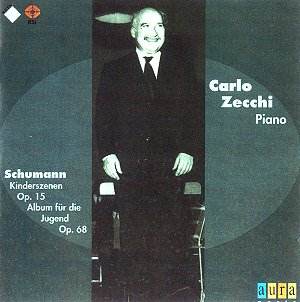One of the first discs I reviewed for the site was Auraís tribute to Guido Agosti (AUR 205-2), and I remarked at the time that the Italians love a good myth as well as anyone. The most famous Italian pianistic myth was obviously Arturo Benedetti Michelangeli, whose legendary status grew with every concert he cancelled. Two other names to be mentioned only with your most baited breath in Italian gatherings of the great and good are Guido Agosti (see review for details of that story) and Carlo Zecchi.
The present CD comes with the inevitable note from Italyís number one piano-fancier Piero Rattalino, and states the case very well (but the English translation is wretched). Zecchi was born in Rome in 1903, made his Italian debut in 1920, first performed abroad in 1922, studied with Schnabel and Busoni in Berlin in 1923 and made his first tour of the United States in 1931. He turned to conducting in 1938. At some stage he had an accident (neither here nor elsewhere can I find the exact date and nature of this) which meant that after the war he played only as the duo partner of the cellist Enrico Mainardi, otherwise concentrating on conducting Ė he toured America with the Florence May Festival Orchestra in 1957 and was permanent conductor of the Vienna Chamber Orchestra from 1964 to 1976 Ė and teaching, mostly at the S. Cecilia Academy in Rome and the Salzburg Mozarteum. He died in 1984.
As to the precise nature of his retirement, both "noble" and "ignoble" reasons have been suggested. The "noble" explanation is that maintaining his art at the high level which his perfectionism required of him was costing him much psychological strain and the accident contributed to his abandoning the attempt, especially in view of the emergence of Michelangeli, against whom he would have had to measure himself. The "ignoble" reason is that he had received a handsome sum from his insurance company as compensation for the curtailment of his solo career, and, being notoriously tight-fisted, chose to keep the money rather than hand it back and start playing again. He did still entertain friends with pieces of no great difficulty and, as can be heard here, was persuaded by Swiss-Italian Radio to record a selection from Schumannís "Album for the Young" in 1967.
Thus the myth grew up of a supremely great pianist whose actual solo career had ended long ago and was scarcely documented in sound. Not much of his conducting career was preserved on disc either; many readers will remember that he recorded Beethovenís 4th Concerto with Clara Haskil on an early post-war Decca, in May 1954 he set down Haydnís 100th Symphony, Schumannís Rhenish, Brahmsís 2nd Serenade and Verdiís Overture to I Vespri Siciliani with the Amsterdam Concertgebouw and many years later a coupling of Haydn Symphonies on Supraphon aroused controversy because of the extreme breadth of the slow movements. I havenít heard this but I remember a Mozart Serenade broadcast by a German or Austrian radio station in the late 1970s in which he invested the slow movements with a gravity worthy of the St. Matthew Passion. It was weird but fascinating. I daresay the Austrian and Italian radio archives could between them provide a fairly complete picture of his interpretations as a conductor, but, though he was admired in this role, the implication has always been that he was great as a pianist.
Does the disc bear this out? Well, Rattalino cites his recording of Chopinís "Barcarolle" as the best evidence of his powers, and also gives high praise to a number of other short pieces, including Lisztís "Leggierezza" and Debussyís Poissons díor", so we may wonder if the present compilation tells the whole story, even in so far as it is there to be told. The 1967 recordings are close-miked with a degree of distortion; he announces each piece (in Italian) in an incredibly bored-sounding voice and catches a few crabs in "Jägerliedchen", maybe with the aim of throwing insurance sleuths off the scent. Aspiring young pianists looking for a shining example will certainly find much attentive phrasing, clear and well-balanced textures and some inkling of the poetry that a great artist can distil from these pieces. But I donít think theyíll quite be persuaded to love the music, and maturer listeners may remain of the idea that, while these simple little pieces serve admirably the purpose for which they were written, Schumannís inspiration was not always at white heat.
Turning to "Kinderszenen" reveals a very different situation. Distance can sometimes lend enchantment to crumbly old recordings, yet there really does seem to be the magic of a great interpreter at work here. He does not go in for exaggerated rubatos (the only point I queried purely as a reading of the score was his staccato rendering of the "Important Event") and the music flows out of him very naturally. "Traumerei" is equal to any Iíve heard, poetic yet kept on the move. Zecchiís control of the ebb and flow of the music seems to be the secret here and in all the gentler pieces. A classic version. A pity the discs are in rather bad condition; we are not told their provenance. If these were commercial recordings then could a better copy not be found? But if they are from radio archives then maybe they are the only copies and we will have to put up with them.
A recommendation just for "Kinderszenen" (all 15í16" of it) is difficult, but Zecchi was a fascinating figure and collectors of pianists on record can hardly ignore him.
Christopher Howell>
